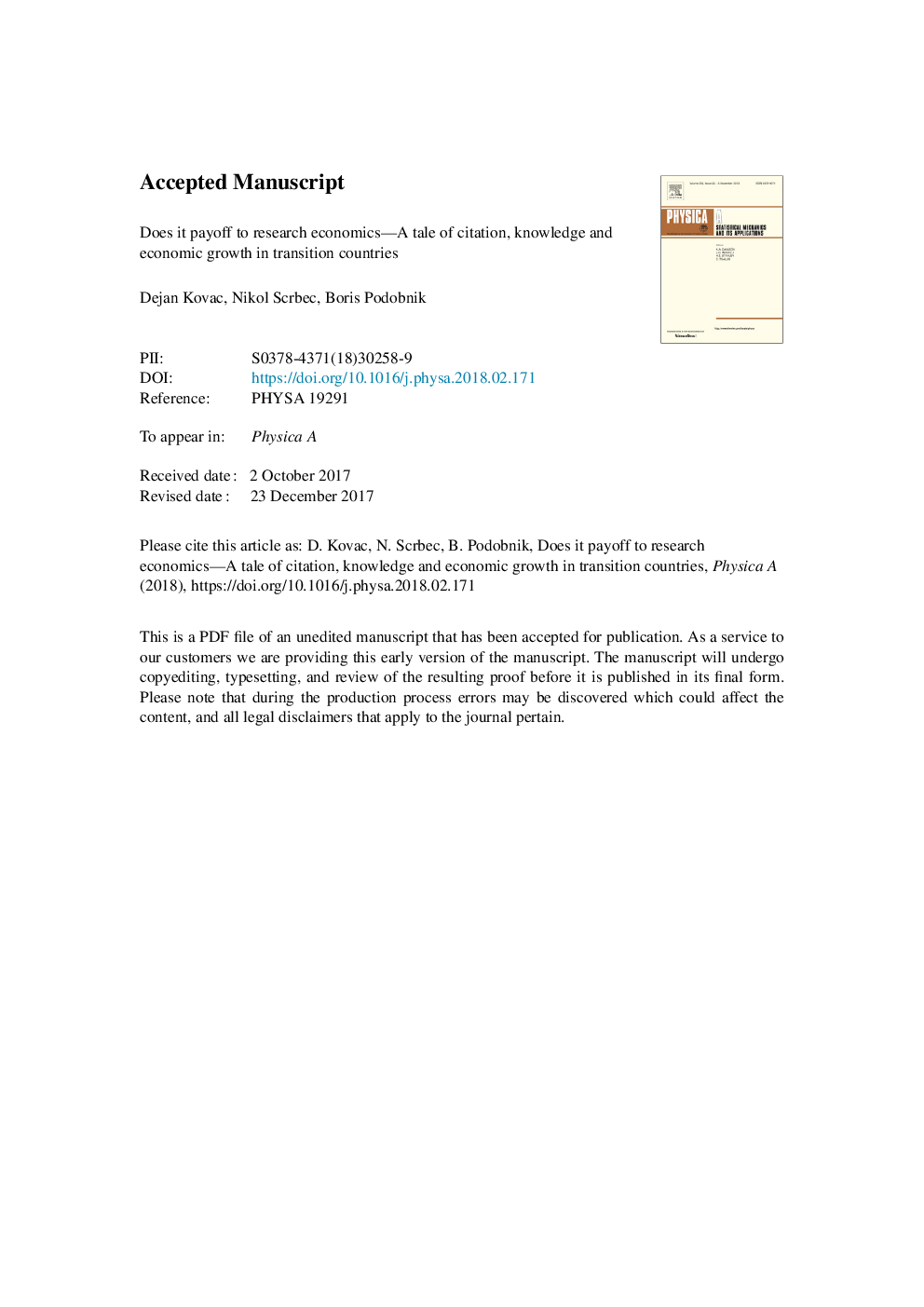| کد مقاله | کد نشریه | سال انتشار | مقاله انگلیسی | نسخه تمام متن |
|---|---|---|---|---|
| 7375226 | 1480068 | 2018 | 26 صفحه PDF | دانلود رایگان |
عنوان انگلیسی مقاله ISI
Does it payoff to research economics-A tale of citation, knowledge and economic growth in transition countries
ترجمه فارسی عنوان
آیا به اقتصاد تحقیقاتی رسیده است؟ داستان درباره استناد، دانش و رشد اقتصادی در کشورهای در حال گذار
دانلود مقاله + سفارش ترجمه
دانلود مقاله ISI انگلیسی
رایگان برای ایرانیان
کلمات کلیدی
ترجمه چکیده
بسیاری از نظریه های اقتصادی وجود دارند که سرمایه انسانی را به عنوان یک راننده کلیدی رشد اقتصادی کشور ترویج می دهند، اما چالش بر این است که این تئوری را به طور تجربی بر روی یک سطح کشوری سنجیده شود و ضرایب را به علت چندین مشکل شناسایی تفسیر کند. ما سعی کردیم با استفاده از یک آزمایش شبه طبیعی که یک قرن پیش به وقوع پیوسته بود، به این سوال خاص پاسخ دادیم- یعنی سقوط بلوک کمونیستی در اروپای شرقی. ما از یک شوک به یک حوزه علمی خاص استفاده می کنیم - اقتصاد، برای بررسی اینکه آیا سرمایه گذاری های آینده در آن زمینه خاص منجر به افزایش رفاه و رشد اقتصادی شد. پارادایم اقتصادی که بر تمامی بلوک کمونیست حاکم بود، متوقف شد. سرمایه انسانی بیش از هر زمان دیگری از بین رفت و تمام کشورهای کمونیستی باید از اقتصاد برنامه ریزی شده به اقتصاد بازار منتقل کنند. در سال های بعد، کشور ها با سرمایه گذاری بیشتر در سرمایه انسانی و تحقیقاتی، باید با اقتصاد بازار سازگار شوند. ما دریافتیم که کشورهایی که هر دو جزء ذکر شده را در اختیار ندارند 25 سال بعد رشد اقتصادی و ثروت نسبتا پایین تر داشتند. بر خلاف اقتصاد، دیگر زمینه های مانند فیزیک و پزشکی از طریق یک فرآیند در جریان نیست، بنابراین ما از آنها به عنوان یک اثر پلاسبو برای مطالعه ما استفاده می کنیم. ما دریافتیم که نسبت نسبی نشریات بین اقتصاد و فیزیک در کشورهای پست کمونیستی تنها 15 سال پس از یک پارادایمی افزایش می یابد شوک که شواهد حاکی از آن است که زمان سرمایه گذاری در زمینه علمی خاص بیشترین اهمیت را دارد.
موضوعات مرتبط
مهندسی و علوم پایه
ریاضیات
فیزیک ریاضی
چکیده انگلیسی
There are many economic theories that promote human capital as a key driver of a country's economic growth, but it is challenging to test this theory empirically on a country level and causally interpret the coefficients due to several identification problems. We tried to answer this particular question by using a quasi-natural experiment that happened quarter century ago -Â the fall of communist block in Eastern Europe. We use a shock to a particular scientific field -Â economics, to test whether the future investment into that particular field resulted in increased welfare and economic growth. The economics paradigm that was governing all of the communist block ceased to exist. Human capital depreciated over night and all communist countries had to transit from planned economy to a market economy. In the following years countries had to adapt to market economy through additional investment in human capital and research. We find that countries which lack both of the two fourth mentioned components had 25 years later a relatively lower economic growth and wealth. Unlike economics, other fields such as physics and medicine did not go through the same process so we use them as a placebo effect for our study. We find that the relative ratio of citations between economics and physics in post-communist countries is increasing only 15 years after the “paradigm” shock which gives a suggestive evidence that timing of investment into particular scientific field matters the most.
ناشر
Database: Elsevier - ScienceDirect (ساینس دایرکت)
Journal: Physica A: Statistical Mechanics and its Applications - Volume 505, 1 September 2018, Pages 293-305
Journal: Physica A: Statistical Mechanics and its Applications - Volume 505, 1 September 2018, Pages 293-305
نویسندگان
Dejan Kovac, Nikol Scrbec, Boris Podobnik,
